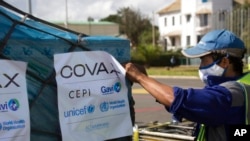An international donor conference on Friday raised $4.8 billion for the U.N.-backed COVAX plan to deliver coronavirus jabs to poorer countries, organizers said.
"The pandemic is not over, far from it. Until we beat COVID-19 everywhere, we beat it nowhere. That is a fact, and a responsibility for all of us," said German Chancellor Olaf Scholz, co-host of the online conference.
Scholz, whose bid to make COVID jabs mandatory for over-60s in Germany failed in parliament this week, warned that the ongoing pandemic risked creating new variants that could be "more dangerous" than previous ones.
The conference, hosted by Germany, Ghana, Senegal and Indonesia, sought to address a yawning gap in vaccination rates between the world's richest and poorest countries.
The COVAX program, co-led by vaccine-sharing alliance Gavi, the World Health Organization and the Coalition for Epidemic Preparedness Innovations, has so far delivered 1.4 billion doses to 145 countries — far short of the planned 2 billion doses by the end of 2021.
Governments from developed nations pledged $3.8 billion Friday to bring the vaccine to 92 low- and middle-income countries.
Development banks including the World Bank and the European Investment Bank contributed $1 billion Friday.
COVAX had said in January that it needed $5.2 billion to fund jabs for the world in 2022.
The WHO wants 70% of every country's population vaccinated by July.
But records are uneven.
Nearly 80% of France's population, for example, has received two doses. But only 15% of the population on the continent of Africa is fully vaccinated, according to Oxford University data.
COVAX says it currently has enough doses to vaccinate about 45% of the population in the 92 low- and middle-income countries receiving donations. But 25 of those countries lack the infrastructure for an effective immunization campaign.
Making matters worse, many developing countries are slated to receive doses too close to their expiration date.
"Vaccine inequity is the biggest moral failure of our times, and people and countries are paying the price," U.N. Secretary-General Antonio Guterres said earlier this year.




